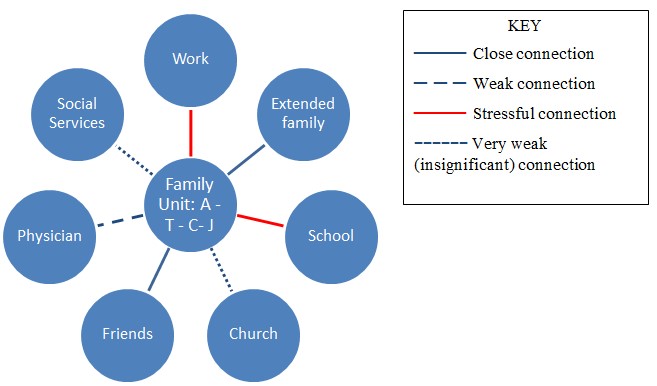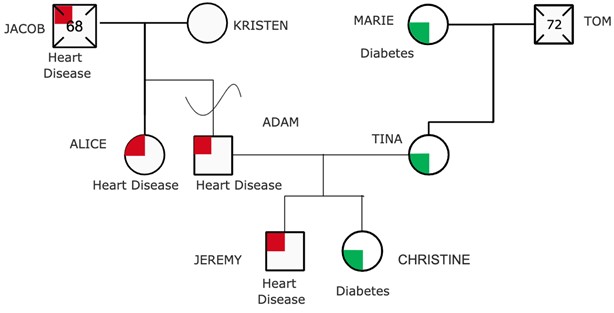Introduction
The notion of health in today’s social paradigm has become one of the most significant aspects of one’s lifestyle and role within the community. While some people claim health to be a highly individual matter that could be controlled by regular check-ups and healthy lifestyle habits, the very roots of the issue go far beyond one’s health assessment. Such factors as family genetics, illness history, community lifestyle directly influence the overall health condition of an individual, contributing to the rapid changes in one’s health behaviors. Scholars define health behaviors as any actions or patterns that might potentially influence the overall health condition and mortality risk (Fadlon & Nielsen, 2019). One of the major influencers in terms of one’s health is family, as family members are both physically and mentally related, causing a drastic impact on each other’s health patterns. In terms of the following paper, the family of four people will be analyzed on the matter of family health with the help of a designed questionnaire that will help estimate the family’s ecomap and genogram. The questionnaire with an answer summary may be found in Appendix A.
Family Information
The assessed family consists of the four members: mother A., father T., daughter C., and her younger brother J. The couple has been married for 22 years, and both children were born into the marital family. Both parents are 45 years old, the daughter is 20 years old and lives with her boyfriend in a rental apartment, and the youngest family member is 16 years old. The family has lived in Miami-Dade County for their whole life and seldom goes abroad for vacations, work, etc. When speaking of ethnicity, it should be outlined that the father is African American, and the mother is Caucasian. The only religious person in the family is the mother, as her parents have a strong Christian background, with other family members being rather indifferent to the matter.
Three out of four family members have full-time jobs: the mother works as an accountant for the Miami-Dade County municipal body, the father is a sales manager in the medical equipment enterprise, and the daughter works as a manager in a local electronics store. All of the aforementioned jobs presuppose full or partial health insurance, and the average income in the family can be characterized as a strong middle class. The issue of the family environment is evident in the following ecomap:

Health Behaviors Summary
Although the overall characteristics of the family setting seem to fall into the category of a healthy family, there are various incidents of health behaviors among family members that require additional attention. To begin with, it is important to outline the level of stress that contributes to the health condition, as everyone in the family is extremely stressed by issues at work and school. This leads to frequent misunderstandings within the unit and results in a high risk of problems with mental health.
Another detrimental issue concerns the patterns of substance and tobacco use within the family. The father has been a heavy smoker for the past ten years, and the son started smoking at the age of fourteen. All the family members drink alcohol on an average basis, including celebrations and vacations, but since the daughter has moved to a rental apartment with her boyfriend, she tends to drink practically every weekend when she goes out with friends. Finally, it was estimated that the father’s grandfather and father had issues with the cardiovascular system, and the mother’s ancestors had incidents of diabetes, considerably increasing one’s chances of obtaining such a health condition (Peiris et al., 2018). Although family members are well aware of the disease predisposition, they tend to ignore both the mental and physical well-being required to avoid the issue.
Strengths and Barriers
In the course of the assessment, family members were asked to answer a series of questions related to various functional health patterns. The following notion stands for a model that consists of all the possible aspects of one’s life that might eventually result in health condition deterioration (Khatiban et al., 2019). While including a variety of factors, their interrelation might contribute to developing a balance for a healthy lifestyle. However, when considering the existing situation within the family, it might be concluded that the barriers to such patterns outweigh the estimated strengths. The latter includes a stable socio-economic environment, self-perception and lack of body image issues, healthy allocation of roles within the unit, and mostly healthy patterns of average family nutrition. The barriers, in their turn, include substance abuse, stress levels, lack of work-life balance and proper rest patterns, poor coping mechanisms, and genetic predisposition for severe chronic illnesses like cardiovascular disease and diabetes. The latter issue could be observed vividly in the following genogram:

Conclusion
Taking everything into consideration, it might be concluded that the concept of health and lifestyle correlation is now frequently undermined by people who consider themselves to be healthy due to the lifestyle they lead. In the example of the following family health assessment, it was estimated that the interdependence of both mental and physical habits, along with genetic information, plays a significant role in the overall process of health formation. Thus, it is of crucial importance to pay enough attention to all the functional health patterns to secure sustainable health conditions in the long-term perspective.
References
Fadlon, I., & Nielsen, T. H. (2019). Family health behaviors. American Economic Review, 109(9), 3162-3191.
Khatiban, M., Tohidi, S., & Shahdoust, M. (2019). The effects of applying an assessment form based on the functional health patterns on nursing student’s attitude and skills in developing the nursing process. International Journal of Nursing Sciences, 6(3), 329-333.
Peiris, H., Park, S., Louis, S., Gu, X., Lam, J. Y., Asplund, O.,… & Kim, S. K. (2018). Discovering human diabetes-risk gene function with genetics and physiological assays. Nature communications, 9(1), 1-11.
Appendix A
Family Health Assessment Questionnaire
- What does your family value the most in terms of morality? The major values of all the family members include financial stability, respect for each other, and trust.
- Which role does health play in your set of values? Health is a highly important aspect of human life, but it is frequently undermined by other life aspects such as work or financial necessities.
- What, in your opinion, is a key to good health status? The key to good health is a lack of stress and a proper level of financial security.
- How do you imagine proper nutrition patterns? Proper nutrition can be achieved through a balanced diet, which includes proteins, fats, and carbohydrates.
- What does your current diet look like? The diet is not quite balanced, as stress at work and inability to find time to cook leads to the fact that family frequently eats take-out food for dinner.
- How, in your opinion, does nutrition influence your health? Proper nutrition helps people stay fit and avoid problems with the cardiovascular system and spine.
- How many hours a day do you usually sleep? During weekdays, parents usually sleep 5-6 hours, children – 5-8 hours. During weekends, parents sleep 10 hours on average, children – 9-12 hours.
- How would you assess your sleep quality? The quality of sleep is not satisfying, as parents frequently wake up at night, and the son tends to wake up tired regardless of the number of sleeping hours.
- What do you usually do to let your body relax and have some rest in general? Both children and parents feel like doing nothing is one of the most available ways to relax and have some rest, including sleeping.
- Does anyone in your family have issues with the kidneys or bladder? Nobody in the family has kidneys of bladder issues.
- How often do you experience excretion complications? Nobody in the family experiences the issues on a regular basis, and parents claim these problems to appear in extreme cases connected to nutrition.
- Does your family have a genetic predisposition for excretory system diseases? There is no predisposition for such issues in the family.
- What kinds of activities and exercises does your family execute on a regular basis? All the family members lead a rather sedentary lifestyle with little exercise, the son has PE lessons at school twice a week.
- What do you do to maintain good physical shape? The mother sometimes goes on various diets to lose weight, and the father plays soccer with work colleagues twice a month.
- Do you promote physical exercise among children? If yes, how? If no, why? Children seem to have no interest in physical exercise, and parents claim to have little time between work to change the situation.
- What are ways of health maintenance? All the family members mentioned sleep amounts and diet without talking about mental health.
- How often do you address literature and specialists on the topic of health maintenance? Family members do not address means of health maintenance besides cases of emergency.
- How do your children get information on general well-being? They are/were told about the issue at school/college; parents do not mention the topic in conversations with children.
- Does anyone in your family have eyesight problems? Every family member has excellent eyesight.
- What disease predisposition does your family have? The father has a serious predisposition for heart diseases, and the mother has a predisposition for diabetes.
- What sensory perception issues does anyone in your family have at the moment? There are no evident issues at the moment.
- How would you assess your current lifestyle in terms of health maintenance? Family members note that they do not think their lifestyle is healthy, but they are not worried about the issue, as they are focused on other life priorities.
- How do you try to control your health status? The best way to control health status is to do regular check-ups, but family members undergo these only when it is required for work/documents, etc.
- How would you assess your responsibility for health maintenance? Parents pay practically no attention to their own health, focusing on children who ignore parents’ recommendations.
- How would you describe your current relationship in the family? The relationship is good, but the communication is not well-established in the parent-child paradigm.
- How, in your opinion, do family relations influence health? According to everyone, family relations help find support in case of an emergency.
- What kind of disagreements does your family experience the most? Most disagreements concern household chores and minor arguments, and there are no serious misunderstandings.
- How would you describe your sexual life at the moment? The sexual life of parents is not satisfactory due to the feeling of constant fatigue at work, daughter has a long-term sexual partner; the son tends to stay silent about his experience.
- What issues, if any, does anyone in your family have in terms of sexual dysfunction? There is no evidence of sexual dysfunction within the family.
- How would you assess the level of your children’s sex education? Children have sex education classes at school, but the parents feel uncomfortable talking on such topics in the family, so the level of education is not satisfactory.
- How often do you experience stress both at work/university/school and at home? Everyone in the family claims to experience much stress in terms of work and education. The stress level at home is also high, as members seem to behave aggressively when they experience pressure and stress outside the house.
- What coping mechanisms do you use in order to deal with stress? Family members do not have any coping mechanisms, so they either share their concerns or go through them individually.
- How, in your opinion, does stress influence your health? Stress has a negative impact on health, but family members underestimate its implications on health status.

